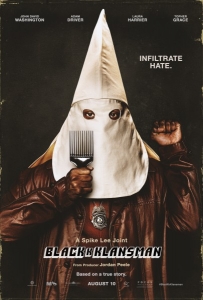
Spike Lee’s fascinating and timely cinematic hit, BlacKkKlansman, has earned a whopping 95% rating on Rotten Tomatoes. The reviews are all very similar. You may be able to imagine that one guy’s voiceover on almost all movie trailers, “entertaining, witty, funny, intelligent, and thought-provoking.” All of these may be true but it is important to realize that BlacKkKlansman is one of the most crucial films of our times. The film highlights the history of racism and bigotry in America. It asks you to take into consideration how America was more than five decades ago, and what you see happening today.
Before we get into that, here is a brief synopsis. In 1978, Ron Stallworth is recruited to be the first ever black police officer in Colorado Springs, Colorado. As Ron is searching through newspaper ads, one ad in particular catches his eye: a listing for the Ku Klux Klan. He dials their number directly, not realizing that one phone call would embark a series of events that would remain one of the most outrageous and radical stories of all time.
His mission becomes to convince the members of the KKK that he is interested in becoming a member. He spews out racial slurs and states how his sister had fallen for a black man and that he just can’t stand thinking about his black hands touching her “pure white skin”. The whole scene is carried out quite comically. Surprisingly, the Klan becomes supremely intrigued by Ron and how he would contribute to their “organization.” His colleague, who (in the film) is named Flip Zimmerman, goes undercover impersonating Ron, meeting face-to-face with the Klan to befriend its members and gain intelligence on their schemes and conspiracies. Ron, on his end, has conversations with the Klan on the phone and forms a surprisingly cordial relationship with the grand wizard of the KKK, David Duke. Ron and Flip’s mission is to unveil the KKK and orchestrate it’s downfall.
The objective of BlacKkKlansman is to wake us up to the realities of American racism. Spike Lee does a tremendous job of illustrating how racism and classism are as existent now as they were then. The circumstances are different, but the effect is still the same. This film’s intent is to outrage us so that we will want to contribute to making the future, unlike those times. It’s telling us that it is imperative to not remain stagnant, not standing by watching as things happen. Before we did not have a choice. Black people and those who stood for and by black people would be lynched. Lee urges us to recognize that there is nothing holding us back now from standing up for those who are broken, other than our own fears or neglectfulness. We all have some sort of privilege. As Goucher students, higher education is our privilege. I encourage you to think about how to use that privilege, and to use that education to do something powerful, and life-altering with it.
BlacKkKlansman highlights that the Klan’s agenda was to show the world that the white race was the superior race. It exemplifies how an “us versus them” mentality will only return us back to racial and class segregation. In one scene a parallel is made between the deadly protests in Charlottesville, VA just a year ago to images when black people were ostracized in public decades earlier, proving that not only has racial violence like this happened in the past, but that it is happening now. This film was not solely intended for an all-black audience. It’s intended for viewers of different backgrounds and identities to get a glimpse of the history of racism in America. That being said, this national dilemma is not a “blacks only” problem. It is a human rights problem. Being human means standing up for what is right. Racism in America will not end unless we stand for peace and not tolerate or uplift those who contribute to violence and racial hatred.
All in all, BlacKkKlansman provides a small amount of insight into the horrific truth of what it means to be alive as a black person in the 1970s and dating back centuries before that. It begs us to remember that black people did not choose to be enslaved or choose to be discriminated against. Slavery is not over. Slavery is not something that we as a nation, as a community can forget about. Especially not since black people are still being dragged and killed in the streets. American colonization initiated centuries of oppression, genocide, racism, slavery, that of which if one didn’t live, survive, though, that cannot begin to imagine or understand. This movie was made for the audience to become knowledgeable of these events and tragedies that took place, so they are neither ignorant nor complacent.
This film truly is magnificent in persuading viewers to rethink their current biases and opinions. I encourage you to see this movie because you will have a new outlook on life, in general, if you watch carefully. The end scene displays an American flag that fades into black and white until it completely disappears. Take away from that what you will.
